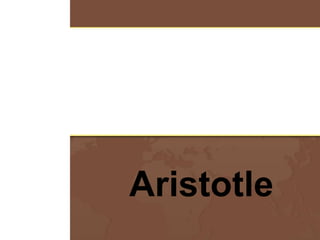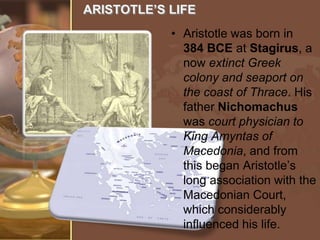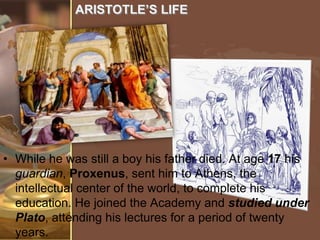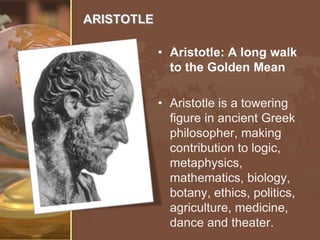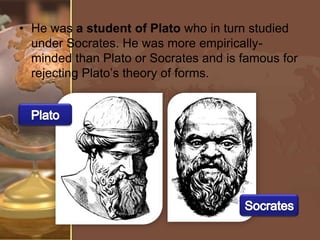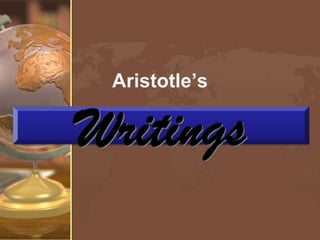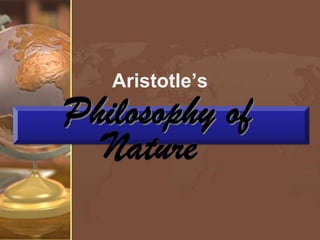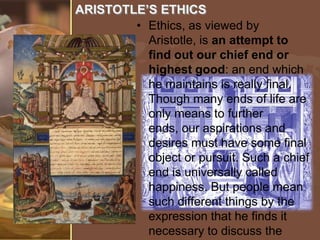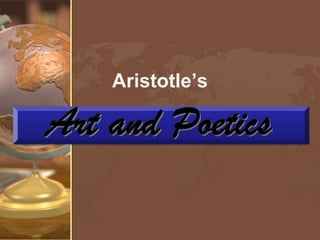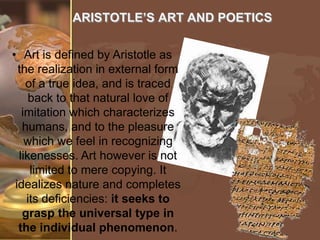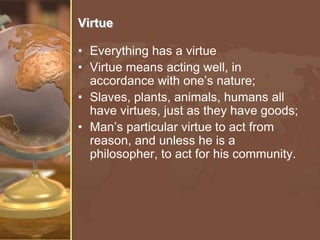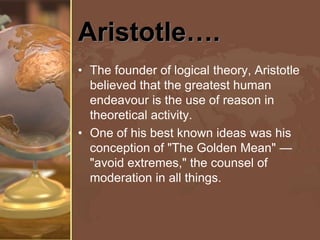Aristotle
- 1. Aristotle
- 3. ARISTOTLE‚ÄôS LIFE ‚Ä¢ Aristotle was born in 384 BCE at Stagirus, a now extinct Greek colony and seaport on the coast of Thrace. His father Nichomachus was court physician to King Amyntas of Macedonia, and from this began ¥°∞˘æ±≤ı≥Ÿ¥«≥Ÿ±Ù±‚Äôs long association with the Macedonian Court, which considerably influenced his life.
- 4. ARISTOTLE’S LIFE • While he was still a boy his father died. At age 17 his guardian, Proxenus, sent him to Athens, the intellectual center of the world, to complete his education. He joined the Academy and studied under Plato, attending his lectures for a period of twenty years.
- 5. ARISTOTLE • Aristotle: A long walk to the Golden Mean • Aristotle is a towering figure in ancient Greek philosopher, making contribution to logic, metaphysics, mathematics, biology, botany, ethics, politics, agriculture, medicine, dance and theater.
- 6. • He was a student of Plato who in turn studied under Socrates. He was more empiricallyminded than Plato or Socrates and is famous for rejecting Plato’s theory of forms.
- 7. • As a prolific writer and polymath, Aristotle radically transformed most, if not all, areas of knowledge he touched. It is no wonder that Aquinas referred to him simply as “The Philosopher.” In his lifetime, Aristotle wrote as many as 200 treatises, of which only 31 survive. Saint Thomas Aquinas “The Philosopher”
- 8. • Aristotle was the first to classify areas of human knowledge into distinct disciplines such as mathematics, biology, and ethics. Some of these classifications are still used today. • As the father of the field of logic, he was the first to develop a formalized system for reasoning. Aristotle observed that the validity of any argument can be determined by its structure rather than its content. A classic example of a valid argument is his syllogism: All men are mortal; Socrates is a man; therefore, Socrates is mortal.
- 9. • Aristotle did not take over Plato’s Academy, but he started his own school, the Lyceum. • His teaching method, peripatetics, involved walking about and talking. • Aristotle became Alexander the Great’s tutor though his philosophy focused on the polis and Alexander embraced the vision of a cosmopolis.
- 10. • With Alexander’s death, antiMacedonian riots broke out in Athens, and Aristotle fled lest ―Athens commit the same crime twice.‖ • We have over 2,000 pages of writings attributed to Aristotle including his great book, Politics.
- 12. ARISTOTLE‚ÄôS WRITINGS ‚Ä¢ It is reported that ¥°∞˘æ±≤ı≥Ÿ¥«≥Ÿ±Ù±‚Äôs writings were held by his student Theophrastus, who had succeeded Aristotle in leadership of the Peripatetic School. The works of Aristotle fall under three headings: Collections of Dialogues and facts and material other works of a Systematic works from scientific popular character treatment ‚Ä¢ Among his writings of a popular nature the only one which we possess of any consequence is the interesting tract On the Polity of the Athenians.
- 14. ARISTOTLE‚ÄôS LOGIC ‚ÄúOrganon‚Äù Peripatetics ‚Ä¢ ¥°∞˘æ±≤ı≥Ÿ¥«≥Ÿ±Ù±‚Äôs writings on the general subject of logic were grouped by the later Peripatetics under the name Organon, or instrument. From their perspective, logic and reasoning was the chief preparatory instrument of scientific investigation. Aristotle himself, however, uses the term ‚Äúlogic‚Äù as equivalent to verbal reasoning.
- 16. ARISTOTLE‚ÄôS METAPHYSICS ‚Ä¢ ¥°∞˘æ±≤ı≥Ÿ¥«≥Ÿ±Ù±‚Äôs editors gave the name ‚ÄúMetaphysics‚Äù to his works on first philosophy, either because they went beyond or followed after his physical investigations. Aristotle begins by sketching the history of philosophy. For Aristotle, philosophy arose historically after basic necessities were secured. It grew out of a feeling of curiosity and wonder, to which religious myth gave
- 18. ARISTOTLE‚ÄôS PHILOSOPHY OF NATURE ‚Ä¢ Aristotle sees the universe as a scale lying between the two extremes: form without matter is on one end, and matter without form is on the other end. The passage of matter into form must be shown in its various stages in the world of nature. To do this is the object of ¥°∞˘æ±≤ı≥Ÿ¥«≥Ÿ±Ù±‚Äôs physics, or philosophy of nature. It is important to keep in mind that the passage from form to matter within nature is a movement towards ends or purposes. Everything in nature has its end and function, and nothing is without its purpose. Everywhere we find evidences of design and rational plan.
- 20. ARISTOTLE’S ETHICS • Ethics, as viewed by Aristotle, is an attempt to find out our chief end or highest good: an end which he maintains is really final. Though many ends of life are only means to further ends, our aspirations and desires must have some final object or pursuit. Such a chief end is universally called happiness. But people mean such different things by the expression that he finds it necessary to discuss the
- 22. ARISTOTLE’S ART AND POETICS • Art is defined by Aristotle as the realization in external form of a true idea, and is traced back to that natural love of imitation which characterizes humans, and to the pleasure which we feel in recognizing likenesses. Art however is not limited to mere copying. It idealizes nature and completes its deficiencies: it seeks to grasp the universal type in the individual phenomenon.
- 24. ARISTOTLE’S POLITICS • Aristotle does not regard politics as a separate science from ethics, but as the completion, and almost a verification of it. The moral ideal in political administration is only a different aspect of that which also applies to individual happiness. Humans are by nature social beings, and the possession of rational speech (logos) in itself leads us to social union.
- 25. The Six Forms of Regimes Number of Rulers Rule Serving the Common Good One Kingship or monarchy Aristocracy Polity Few Many Rule Serving Private Interest or Those Who Rule Tyranny Oligarchy Democracy
- 26. • Politics is not the highest thing to be pursued, but it lays the foundation for the pursuit of the highest including the theoretical virtues of wisdom, first principles, and science. – Political happiness consist of the activities of all the moral virtues in a full life. – Theoretical happiness is grounded in the contemplative life. – The philosopher must find a protected place in the polity to pursue this happiness though some regimes do not permit the division between the political and the theoretical.
- 27. For Aristotle…. • Knowledge comes from the senses and can be true in itself. • Reality consists of matter and form, and matter is a continuous process of developing or becoming. • There is First Cause, source of all change, but is unchangeable itself. This, for him, is God. • The goal of human life is happiness, to reach this is moderation or avoidance of extremes. • Logic would enable man to perceive that the ideal state is one governed by a rule of law, a state ruled by the middle class.
- 28. Happiness • Greeks debated: what is good life, or what is happiness? • Man on the street’s answer: wealth, fame, beauty. • But what is man? What is his function (goal/telos), I.e. what is natural for him? • Key premise: man has reason, and his telos (final end) is to use that reason; “Every • Happiness is an activity of the soul (the action of reasoning part of our being) in man is accordance with virtue (Nicomachean geared Ethics). towards happiness.” • Even contemplation, the highest life for man, is an activity (Pol. 7.3). - Aristotle
- 29. Virtue • Everything has a virtue • Virtue means acting well, in accordance with one’s nature; • Slaves, plants, animals, humans all have virtues, just as they have goods; • Man’s particular virtue to act from reason, and unless he is a philosopher, to act for his community.
- 30. Aristotle…. • The founder of logical theory, Aristotle believed that the greatest human endeavour is the use of reason in theoretical activity. • One of his best known ideas was his conception of "The Golden Mean" — "avoid extremes," the counsel of moderation in all things.

